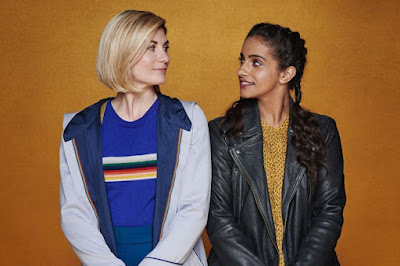It's a weird time for queer representation in fiction.
There's some good news, for sure. The surprise breakout hit Heated Rivalry, a steamy series about two closeted hockey superstars (played by Connor Storrie and Hudson Williams), got stunningly high viewership and ratings, with episode five ("I'll Believe in Anything") becoming the second-highest IMDb-rated television episode ever. (Beaten only by the Breaking Bad episode "Ozymandias.") The two leads, and costars François Arnaud and Robbie G. K., have been signed for two more seasons of the show.
Likewise, the extremely popular (and well-received by the critics) series Heartstopper, and the rom-com movie Red, White, and Royal Blue, have much-anticipated sequels coming out in 2026.
At the same time, though, the Stranger Things season five episode "The Bridge," where the character Will Byers came out to his friends as gay, got review-bombed, with 104,000 people weighing in (more than twice the average). While some reviewers cited poor writing and too many extraneous plot lines -- not new criticisms of the series -- a good many railed against the coming-out scene as "jarring," as well as (I can't even say this word without clenching my jaw) "woke." And of course, it wouldn't be complete without Elon Musk contributing some additional bigotry by tweeting, "It's completely unnecessary and forced on audiences who just want to watch some basic sci-fi."
Netflix also chose to cancel -- after one season, and high ratings -- the queer-inclusive shows Olympo and Boots, the latter after Secretary of Defense Pete Hegseth called it "woke garbage."
Apparently us queer people simply existing is now "woke."
You hear from the homophobes that they're upset that "you can't turn the television on without seeing queer people." Well, y'know what? Given that recent surveys found that around ten percent of people in the United States self-identify as LGBTQ+, you kind of should expect that. (And keep in mind that's only the people who were willing to admit to it. Chances are, the number is significantly higher than that, considering the continuing stigma.)
But you know what else? If you don't want to watch queer-inclusive shows, there's a simple solution:
Don't. Watch. Them.
If you were caught off guard by Will Byers being gay, you weren't paying attention to the eight million clues that had been dropped along the way. And as for Olympo and Boots, those were advertised as dramas about queer athletes and military men, respectively. Judging by the ratings, neither of these shows was unpopular, or lacked viewers; they were axed simply because Netflix chose to kiss the asses of rich bigots who complained.
You homophobes honestly don't need to watch those shows and then whine, or (worse) brigade them. There are plenty of one hundred percent straight television, movies, and books out there for you to enjoy.
And always have been. One of the weirdest comments you hear about queer representation is that exposure to such content "turns people gay," as if some straight fourteen-year-old boy sees a single gay character on a television show and suddenly gets this dazed look and says, "I know! I shall run out and kiss a boy right now." Funny, though, that it doesn't seem to work the other way. I grew up in the 1970s, and damn near every television show and movie I watched featured only straight people in straight relationships, and I came out queer anyhow.
It's almost like it doesn't matter what you watch.
Nota bene: bear in mind that I'm not talking about age-appropriateness, here. That's an entirely different conversation. Heated Rivalry has some scenes that aren't appropriate for people under eighteen, whatever their sexual orientation. Too many people conflate these two entirely separate issues -- often deliberately, to muddy the waters.
But mere representation? Yeah, it should be there, in all kinds of media.
We exist, dammit. I spent four decades feeling invisible because society taught me that I should be ashamed of what I was and who I was. Don't expect me and others like me to vanish again.
So yeah, we've got a way to go. There's still way too much "When will there be a Straight Pride Month, hurr hurr hurr" bullshit whenever Pride rolls around. (My stock answer is "Be glad you don't need one.") And judging by the combination of accolades and condemnations we've seen just in the last month, our culture's attitudes toward queer people are still in a considerable state of ferment.
Let me end by saying what it means to queer people just to see themselves reflected in the fiction they read, watch, and hear. We live in a society where a significant portion of our neighbors would like very much to pretend we don't exist, and where a vocal minority want to see us dead. As for us, we just want to be who we are, openly and without shame or fear. A friend of mine posted the following a few weeks ago:
I wrote a couple of weeks ago about wondering how the trajectory of my life would have been different had I made different choices -- amongst them, coming out when I was a teenager. Of course, you can't ever know the answer to that, so all the regrets I sometimes wrestle with are the very definition of fruitless. But I do know that we can demand a better world now. For everyone, including the marginalized and stigmatized.
And if that's "woke," I proudly accept the label.





